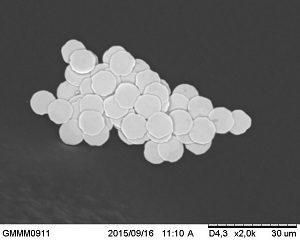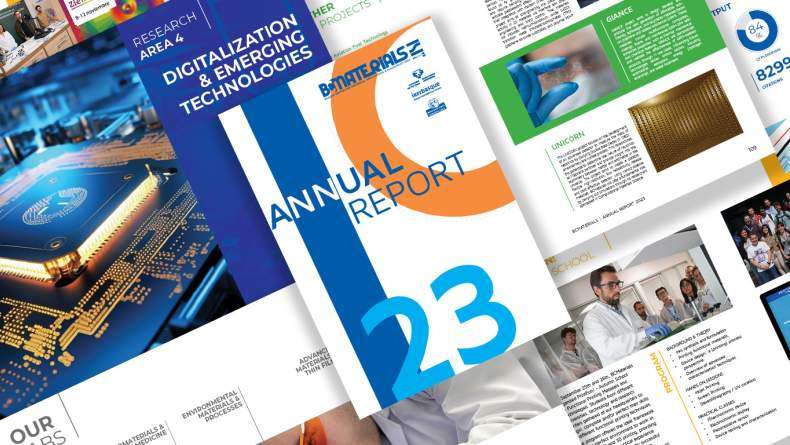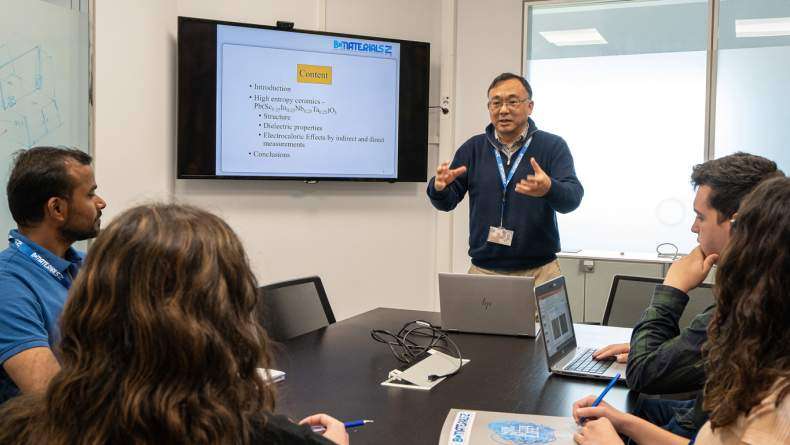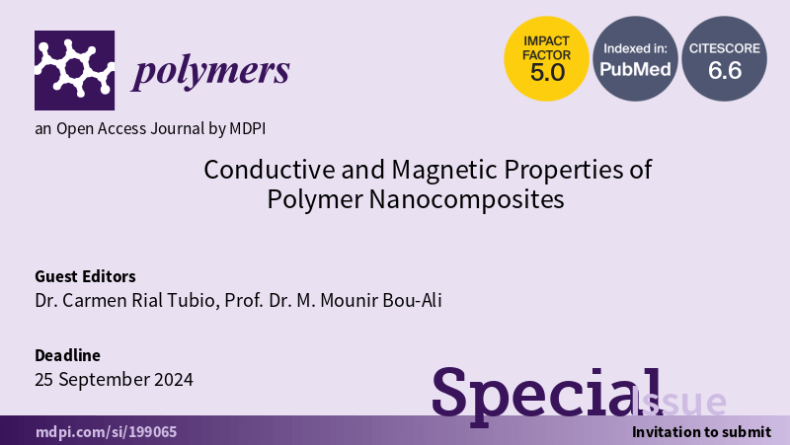BCMaterials Fortnightly Seminars #29

"Detachment and recovery of permalloy nanodiscs for applications"
MAITE GOIRIENA
(BCMaterials)
Magnetic nanoparticles are extensively studied for biomedical applications because their size are comparable to biological entities, while providing remote capabilities of actuation. Disc shaped ferroma gnetic nanostructures display an attractive alternative to chemically-synthetized oxide nanoparticles that are used normally. First, Permalloy (Py) nanodiscs display much higher saturation magnetization and second, with the appropriate dimensions, they can present a spin vortex magnetic configuration, which leads to net zero magnetization at remanence, eliminating the problem of particle agglomeration. Therefore, Py nanodiscs present a huge potential for biomedical applications, ranging from cancer cell destroy by hyperthermia or mechanical actuation to MRI contrast enhancement and drug delivery. In fact, micrometric discs has been shown to produce cell apoptosis by their mechanical oscillation under a low ac field. Discs in the nanometer scale might cross cell membrane expanding the biomedical possibilities.
gnetic nanostructures display an attractive alternative to chemically-synthetized oxide nanoparticles that are used normally. First, Permalloy (Py) nanodiscs display much higher saturation magnetization and second, with the appropriate dimensions, they can present a spin vortex magnetic configuration, which leads to net zero magnetization at remanence, eliminating the problem of particle agglomeration. Therefore, Py nanodiscs present a huge potential for biomedical applications, ranging from cancer cell destroy by hyperthermia or mechanical actuation to MRI contrast enhancement and drug delivery. In fact, micrometric discs has been shown to produce cell apoptosis by their mechanical oscillation under a low ac field. Discs in the nanometer scale might cross cell membrane expanding the biomedical possibilities.
We propose Hole-Mask Colloidal Lithography (HCL) technique, an evolution of Nanosphere Lithography, to prepare Py nanodiscs. Actually, magnetic vortex state Py nanodiscs have already been prepared with different diameter (60 and 125 nm) and thickness (from 30 to 50 nm). Moreover, HCL has been proved to provide a high production yield (about 0.1 mg in a 2" wafer) assessing, at a laboratory scale, the suitability and performance of vortex nanodiscs for biomedical applications. For that, nanodiscs must be detached from the substrate and dissolved in water. Detachment methods have been tested using lithographically defined 10 mm in diameter Permalloy microdiscs, to easily observe the experimental steps. Microdiscs have been successfully detached using either a sacrificial layer of copper or germanium, and later recovered to be dissolved in water. The detachment technique has been reproduced with the nanodiscs and the results are promising.
"Cationic Metal Organic Frameworks: Crystal Structure Determination and Description"
ROBERTO FERNANDEZ
(BCMaterials)
Metal organic frameworks (MOFs) are crystalline and well-ordered materials with potential applications in gas storage, as molecular sieves, catalysis, gas sensing, protonic conductivity… Three dimensional MOFs constructed by cationic frameworks, and more concretely by cationic layers pillared by anionic linkers are scarce. Usually, the positive charge of the cationic layers is compensated by anionic species such as, NO3-, PF6-, ClO4-, or metal-anion complexes encapsulated within the pores or channels of the crystal structures. In other cases, the anion species are linked to the metal centres, but they do not act as linkers.
The synthesis and crystal structure resolution and refinement of two new three dimensional cationic MOFs will be described. Concretely, we have synthesized two MOFs based on (CuBpy)2+ and Cu(Bpa)2+ cationic metal-organic layers pillared by disordered nitrate groups acting as linkers between the metal centres. The cationic frameworks possess large channels in which the tetrahloroethane solvent molecules are guest encapsulated. The crystal structure determination process and the effect of the disordered anion groups and guest molecules in the structural refinement process will be discussed in detail.
Related news
BCMaterials Annual Activity Report 2023
BCMaterials has presented its 2023 Annual Activity Report. The document includes the highlights of the center's scientific activity during the past year, which continues on an upward trajectory in…Pint of Science Festival Bilbao 2024 (May 13-15)
BCMaterials collaborates once again with the Bilbao edition of the Pint of Science science outreach festival. The center also coordinates the event, which will bring 24 talks to four bars in the city…BCMaterials opens its 2024 PhD program
BCMaterials has opened its 2024 PhD program by offering 4 predoctoral contracts to students who want to complete their thesis at our center. The profile of the candidates is students of Chemistry,…Call for papers – ‘Polymers’ Special Issue
BCMaterials researcher Dr. Carmen Rial has been selected, along with Prof. Dr. M. Mounir Bou-Ali from the University of Mondragon (Spain), as Guest Editor for the special issue of Polymers (ISSN 2073…



